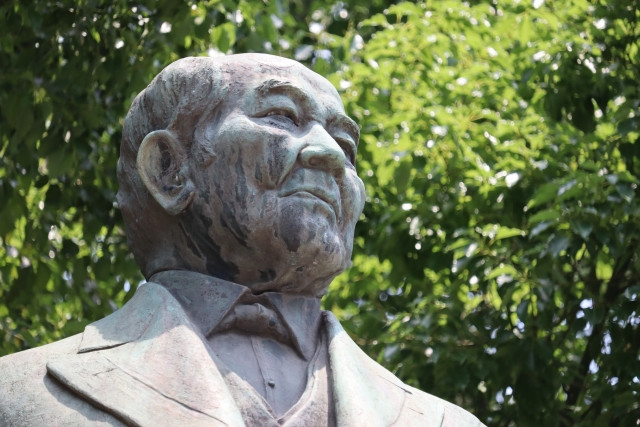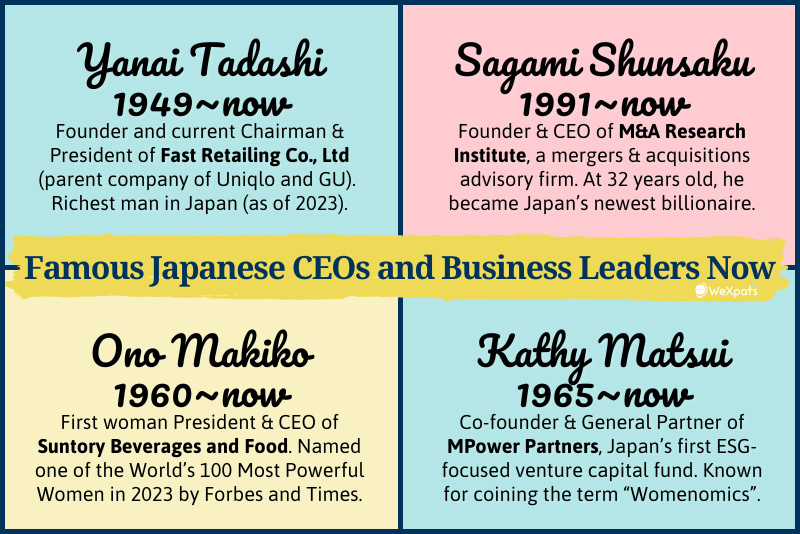Japanese leadership style is characterised by several traits including consensus-building, long-term vision, and focus on group harmony.
In this article, we introduce what qualities make for a good leader in Japan, aka Japanese leadership qualities. We also introduce famous Japanese CEOs in history and in the present that make for excellent business role models.
First Published: 2021-04-08
Updated: 2024-05-22
Table of Contents
- Japanese Leadership Style and Qualities
- Famous Japanese CEOs and Business Leaders in History
- Famous Japanese CEOs and Business Leaders Now
- Find a Job in Japan with WeXpats
 Are you having any issues with job-hunting in Japan?
Are you having any issues with job-hunting in Japan?
Japanese Leadership Style and Qualities

A leader is someone who guides, influences, and inspires others towards a common goal or vision. Leadership involves not only possessing certain qualities and skills but also the ability to motivate and empower others to achieve their full potential.
Japanese leadership qualities often sought or seen in leaders, company presidents, etc. people of authority in Japan include seriousness, diligence, being a visionary, and being a team-player. While these are not surprising qualities for a leader, people may find it surprising to find that these are considered more important than other “typical” leadership qualities such as having charisma and passion, and being a good speaker. Though, there are always exceptions.

Serious and Hardworking
In Japanese, these two qualities can be summed up in the word 真面目 (Majime). Majime is often synonymous with reliability, someone we can trust to undertake a task and do what it takes to accomplish it, and well. This may be why the image of Japanese leadership is often a calm stoic leader as opposed to a charismatic passionate leader - unless the charisma and passion can be backed up with a show of effort and results, it is often seen as empty words and promises.
Long-Term Visionary
A company’s vision and mission is a guiding beacon that directs the organisation’s efforts and decisions. It is up to team leaders to remind members of the company’s vision so everyone can work towards the common goal, and leading the entire organisation is the leader.
Japanese leaders typically have a long-term vision that they share with their organisation as a source of inspiration. Together, everyone works hard and loyally with the leader at the forefront towards achieving that common goal. Along the way, recognising innovation and adaptation in a rapidly changing world, and even better, utilising new technologies towards the goal is a sign of great leadership.
Teamplayer and Consensus-Building
Being a teamplayer is essential to Japanese leadership. Rather than spearheading a project and charging forward, Japanese leaders tend to consult with their trusted teams and make decisions together. This can be seen through the many meetings that occur in Japanese offices, as well as delegation of tasks down the hierarchy.
The practice of 報連相 (Hou, Ren, Sou) - to report, to inform, to consult means team managers, up to the CEO, must be informed of what each sub-division under them is doing and thus work in their best interests.
Again, these are just some of the common qualities that Japanese leaders share. Of course there are leaders who go against the norm and manage to be an “unconventional” leader, and perhaps we will see more of them in the future.
Writer's Pick
Famous Japanese CEOs and Business Leaders in History
There have been many Japanese leaders over the course of its history, not just in politics, but in business and in society. Here are some famous Japanese business leaders you should know.
1. Shibusawa Eiichi (1840~1993)

Shibusawa Eiichi (渋沢栄一) was a prominent Japanese entrepreneur, industrialist and philanthropist. He is known as the “Father of Japanese Capitalism” due to his critical role in modernising and industrialising Japan during the Meiji Restoration period by introducing Western capitalism into Japan. His achievements through his lifetime included the founding, or co-founding, of over 500 companies across various industries including banking, railway, hotel, textile, etc. that contributed significantly to Japan’s economic development.
Beyond his business ventures, Shibusawa Eiichi was deeply committed to social responsibility and business ethics. He was one of the earliest advocates for corporate social responsibility (CSR), long before it became a popular concept. He played a key role in the establishment of numerous educational and philanthropic institutions, leaving a lasting legacy as a champion of both economic progress and social welfare in Japan.
The NHK Taiga drama for 2021, 青天を衝け (Seiten wo Tsuke) is about his life. The new Japanese bills to start circulation in 2024 will feature Shibusawa Eiichi as the historical figure on the 10,000 Yen notes.
You can read more about Shibusawa Eiichi in the link below.
※Shibusawa Eiichi Memorial Foundation, “Brief Biography of Shibusawa Eiichi”
2. Toyoda Kiichiro (1894~1952)
Toyoda Kiichiro (豊田 喜一郎) was a Japanese entrepreneur who transformed his father’s looming company Toyota Industries into what we now know as Toyota Motor Corporation. Under his leadership, Toyota expanded into the automotive industry, and Toyoda achieved his dream of manufacturing Japanese passenger cars. The first Toyota Model AA was completed in 1936. Toyoda’s vision and innovative approach played a pivotal role in establishing Toyota as one of the world’s leading automobile manufacturers to this day.
Not only is Toyoda Kiichiro praised for his company’s success, he is also known as the pioneer of the Toyota Production System (TPS), aka the “Just-In-Time Production” concept which entirely changed manufacturing and production and became widely adopted by various manufacturers across industries. Toyoda’s legacy extends beyond his business success; his efforts also played a significant role in shaping Japan’s post-war economic recovery and development of Japan’s industrial infrastructure. Even in death, he continues to be a role model inspiring generations of business leaders.
※Toyota Motor Corporation, “Toyota Motor Corporation Founder Kiichiro Toyoda Inducted into Automotive Hall of Fame”
3. Ibuka Masaru (1908~1997)
Ibuka Masaru (井深 大) is a Japanese electronics inventor and entrepreneur, renowned for his co-founding of Sony Corporation with Morita Akio. He played a central role in Sony, driving innovation and growth. His leadership and commitment led to development of several groundbreaking products such as the transistor radio, Trinitron colour television, video projector, the Walkman, and the compact disc contributed greatly to consumer electronics worldwide. Alongside Toyota Motor Corporation, Sony Corporation also held an impactful role in Japan’s post-war recovery.
Ibuka Masaru was praised for his innovative prowess and foresight that changed the face of Japanese industries. During the 1960s, he had already predicted that machine learning (AI) would be the future of electronics - the future that has now become our present.
Famous Japanese CEOs and Business Leaders Now

And here, we have Japanese CEOS and business leaders that are still expanding the limits of the Japanese economy.
1. Yanai Tadashi (1949~now)
Yanai Tadashi (柳井 正) is a Japanese billionaire and businessman who is the founder and current Chairman and President of Fast Retailing Co., Ltd., the parent company of global retail brand Uniqlo. Other brands under Fast Retailing Co., Ltd. include GU, Comptoir des Cotonniers, J Brand, and Theory. As of 2023, according to Forbes, he is the richest man in Japan. And, as of February 26th 2024, has a real time net worth of 41.7 billion dollars.
Uniqlo was originally a family’s small tailoring business that under Yanai’s visionary approach to business and commitment to customer satisfaction propelled the brand to success. 40 years after Unqilo first launched, it has become one of the world’s largest apparel brands with over 2400 stores across 25 countries. Yanai’s vision does not end there - he is aiming to make his company the world’s largest retailer.
Outside of business ventures, Yanai Tadashi has also established two foundations - Yanai Tadashi Foundation that offers international scholarship programmes and Fast Retailing Foundation that offers scholarships, refugee support, and environment protection endeavours, etc. in hopes of building a better world.
※Forbes, “Tadashi Yanai & family” [2024.02.26]
2. Sagami Shunsaku (1991~now)
【朝鮮日報様で当社代表取締役社長 佐上の記事が掲載されました🎉】
— M&A総合研究所 (@masouken) October 10, 2023
M&A総合研究所が急成長を遂げた背景や、AIを活用しスピードと効率を高めたマッチング手法などについて記されています!
\朝鮮日報は韓国で最も歴史が長い新聞社であり、発行部数は韓国最大です👏/https://t.co/8Hkfvuu4RY pic.twitter.com/XcLfzfiAUx
Sagami Shunsaku (佐上 峻作) is a Japanese businessman, the founder and CEO of M&A Research Institute, a mergers & acquisitions advisory firm that utilises machine learning (AI). In 2023, at 32 years old, he became Japan’s newest billionaire. According to Forbes, as of February 26th 2024, he has a real time net worth of 1.7 billion dollars. He is an inspiration to young business owners, and proof that times are changing with more value placed on experience and innovation than age and hierarchy.
Indeed, Sagami Shunsaku attributes his success to his experience working in advertising after graduating from university and establishing his own IT venture in 2015 which he sold. Additionally, he used an innovative approach in his business with AI as well as a different business approach by leveraging brokerage fees only after successful deals are made instead of upfront, a first in the industry.
※Forbes, “Shunsaku Sagami” [2024.02.26] ※Forbes, “Super Active 32-Year-Old Dealmaker Is Japan’s Newest Billionaire” [2023.04.28]
3. Ono Makiko (1960~now)
Ono Makiko (小野 真紀子) is a Japanese entrepreneur. She is the first woman President and CEO of Suntory Beverages and Food, and was named one of the World's 100 Most Powerful Women in 2023 by Forbes and Times. In the same year, she also became the first woman CEO of a listed Japanese company worth more than 1 trillion Yen. She is a role model for other, and potential, female Japanese leaders in Japan.
Ono Makiko has a long history of working in Suntory. Her achievements for the company included acquisition of major European drink brands like Schweppes and Ribena. She was also in charge of Suntory’s French business in Orangina, and acquired a winery there.
Aside from her business ventures, Ono Makiko is also dedicated to improving gender equality in Japanese workplaces, starting with Suntory. She aspires to have 30% female managers at Suntory by 2030; the present percentage is 13%.
※Forbes, “Makiko Ono”
4. Kathy Matsui (1965~now)
📢ブログを始めました!
— MPower Partners (@MPower_Partners) January 31, 2022
今回は記念すべき第一弾のブログ記として、我がMPower PartnersのESGの目的や内容を定めた「ESG チャーター」を皆様に公開します!
We're excited to formally share our ESG Charter through our very first blog post!https://t.co/Yx9G9QbgFWhttps://t.co/iv3GiibzB5 pic.twitter.com/ZvpXcdoxkk
Kathy Matsui (キャシー・松井) is a Japanese economist. She is the co-founder and General Partner of MPower Partners, Japan’s first ESG-focused venture capital fund. Prior to this, she was the vice president of multinational investment bank Goldman Sachs in Japan. She is well-known and credited by ex-prime minister of Japan Abe Shinzo for coining the term “Womenomics” that became adopted as government policy. For your information, “Womenomics” is the idea that the advancement of women in economics will improve the economy as a whole.
As you can see, she is a strong advocate of women’s rights and participation in economics and the workforce. Her current company, MPower Partners, also strongly believes that greatever diversity and globalisation will greatly improve Japan’s economy and ventures.
To Close

Japan is full of inspiring leaders and role models, and those we’ve mentioned are just a smidgeon of them. While we have described the general characteristics of Japanese leaders and leadership qualities, there are many growing industries in Japan, and with the rise of start-ups and the ever-changing digital age, there will be a rise in leaders who have fresh perspectives and new leadership qualities as well.
Find a Job in Japan with WeXpats

WeXpats operates a service for foreign nationals who want to work in Japan. There are jobs in a variety of industries. There are 2 services available on WeXpats - WeXpats Agent for full time jobs and WeXpats Jobs for part time jobs.
Looking for a Full Time Position? Leave it to WeXpats Agent!
WeXpats Agent is a career support service that specialises in employment for foreign nationals living in Japan.
Recruitment agencies in Japan are a service where dedicated career advisors will assist you with your job hunt for free. In addition to introducing open positions, we also provide support to help you create your Japanese resume and practice for interviews. Worried about job hunting in Japanese? We are here for you.
Features of WeXpats Agent
-
We have many job openings that are a good fit for foreign nationals to work in, such as translation, interpretation, inbound, etc. jobs that make use of your language skills, as well as engineering etc. jobs that do not require Japanese skills.
-
Our career advisors support and help you prepare your resume and practice job interviews with you. Clearly communicate your strengths to the hiring company.
-
We will handle communication with companies on your behalf, such as arranging interview dates and negotiating conditions. And thereby reducing your stress and time spent.
Finding a Part Time Job? Browse on WeXpats Jobs!

WeXpats Jobs is a part time job site for foreign nationals living in Japan. You can search for jobs in 11 languages (English, Vietnamese, Korean, Indonesian, Traditional Chinese, Simplified Chinese, Burmese, Thai, Spanish, Portuguese), including Japanese. Find jobs that suit you by specifying your Japanese language level, occupation, location, and etc.
※ You can register from outside Japan, but only those living in Japan can apply for jobs.





































